How To Increase Workflow And Reduce Stress With Nature Sounds
Everywhere we go, from ground to sky, we are surrounded by noises. Cars, planes, trains and people are just a few examples of what can be heard throughout any city or town. These noises stimulate our ears almost 24 hours a day, and few choices are available to us for avoiding them — one being specialist equipment, such as noise-cancelling headphones. Being aware of the noises around you will increase your comfort and ability to work more efficiently.

This article will help you become more informed about the impact that noise has on your life. We’ll discuss the good and bad sides of noise and sound (yes, they are different), so that you can use both to benefit your personal well-being. We will look into the science behind why we get distracted by noise and how we can reduce and even negate it.
Before we get started, it is important to clearly distinguish between sound and noise, because they could easily be assumed to be one and the same.
Sound is a physical phenomenon of air particles vibrating — being squashed together by energy and then bouncing back. The vibrating air is what our ears sense. Simply put, “sound” is a word we use to describe the things we hear.
Noise is a more sinister being. It is defined as “unwanted sound,” which can interrupt, distract, stress and tire us and inhibit our mental performance. It’s only recently that these symptoms have been observed to be amplified and, in some cases, caused by noise in the workplace. These unwanted noises invade the personal privacy of workers across the globe.
The Importance Of Personal Privacy
Open-plan offices have been popularized for the reported benefits of improved productivity among workers who work in close proximity. Their popularity is due to cost efficiency and the smaller carbon footprint. One company that uses them is Accenture, one of the world’s leading consulting companies. Hartford Business, a publication of the Hartford Business Journal, describes how Accenture reduced its office space footprint from 23,000 square feet (2136 square meters) to 8000 square feet (743 square meters).
That’s an impressive reduction and use of space, and it’s tremendously cost-efficient. However, a significant side effect of these savings is a deep lack of privacy for the employees who have to spend the majority of their day working in them. Let me explain.
In the last few years, concerns have arisen from the people who work in these environments. It seems that, contrary to what was originally boasted about the open office, they actually hinder mental performance by increasing stress and negative health issues. Journalist Lindsay Kaufman’s first-hand experience of the problem, published by the Washington Post, summarizes very well how people actually feel. Referring to her new open-plan office, she writes “All day, there was constant shuffling, yelling, and laughing, along with loud music piped through a PA system.”
A study undertaken by Steelcase reported that only a mere 11% of the 10,500 people surveyed across Asia, Europe and North America were satisfied with their open-plan workplace. It “confirms that insufficient privacy in the workplace is an issue throughout the world. The survey results show that being able to concentrate, work in teams without being interrupted or choose where to work based on the task are frequently unmet needs.”
A lack of workplace satisfaction leads to workers feeling disengaged, and the cost of this disengagement in the US alone is a whopping $450 to $550 billion, according to the Gallup report “2013 State of the Global Workplace” (PDF).
| Cost of Disengagement | Amount |
|---|---|
| United States | $450 to $550 billion |
| Germany | €112 to €138 billion |
| Australia | $54.8 billion |
| United Kingdom | £52 to £70 billion |
Moreover, the Guardian writes that Canada Life Group Insurance found that people working in open offices took around 75% more sick days than those working from home. The negative issues that seem to plague the open-office environment include those caused by noises.
I could, at this point, list some undesirable noises that cause a general loss in focus and work performance, although the severity of the effects varies from person to person and depends on the noise. Scientific research, however, has uncovered a culprit in the considerable drop in mental performance, regardless of individual preference. That culprit is speech.
Talking colleagues is a primary cause of performance loss and distraction when someone needs to focus on their work. Karin Zimmer, a sound quality researcher at Aalborg University in Denmark, observed a drop of as much as 52.2% in work performance when people were exposed to speech noise alone. For her paper “The Role of Task Interference and Exposure Duration in Judging Noise Annoyance,” errors were measured in tasks that require use of the brain’s memory recall function, which is closely linked to tasks such as reading, writing and basic numerical tasks. These, I think it is safe to say, make up a large majority of the tasks that need to be done in an office or at a computer.
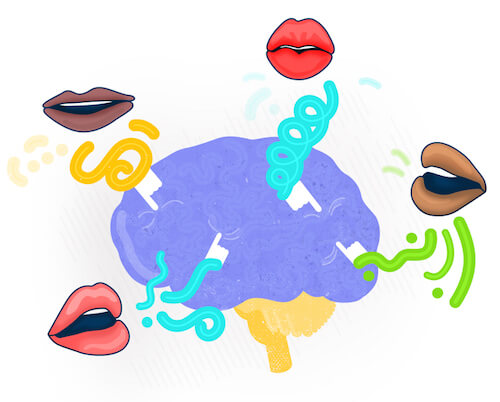
Humans haven’t always been confined to rooms inside buildings when working. There was a time when the noises surrounding us were important to our survival. But as time changed, new meanings were attached to old noises, which became a less crucial part of our daily lives.
New Place, New Meaning
Throughout history, we have had to become accustomed to what we hear around us in everyday life — ascribing meaning to what was critical to our survival. Hearing a threatening animal growl or a large clap of thunder, for example, were things that might have indicated that danger was afoot.
The threat of being ambushed by a pack of lions has been considerably reduced in modern city life. We have ascribed meaning to new things we hear from day to day. The point is that we react in different ways to what we hear. For example, a car horn instantly puts us on alert, distracting us from what we are doing, drawing our attention to it. Something less alarming, like the constant drone or rattle of an air conditioner, can be very annoying, causing stress or frustration when you have to work in the same room. An air conditioner is a perfect example of noise — because it is unwanted.
Let’s explore two ways that our mind reacts to noise: masking and the cocktail party effect.
Masking Unimportant Noise
The brain has incredible capabilities for actively “masking” (sort of ignoring) noises that it deems to be unimportant. Take the air conditioner. The brain applies a mechanism that allows us to ignore this noise, and after some time we forget about it. Simply put, we get used to it.
Jessica Errett, a faculty member in the architecture department at the University of Nebraska, wrote a paper entitled “Effects of Noise on Productivity” in which she and others studied the effects of noise in the office. By playing different types of noise over varying periods of time to a group of people, they found that the noises were reported to be annoying earlier in time. This supports the theory that some sort of active masking is happening in our heads. It also proves that a person’s work performance is drastically reduced by noise if the person finds it annoying. This, as we will see later in the article, is due to the fact that the masking mechanism uses valuable resources that would otherwise be put towards certain work tasks. While your mind is quite efficient at masking noises that are constant and unchanging, unfortunately it fails pretty spectacularly at ignoring noises that it has evolved to pay attention to and noises that are intermittent (i.e. noises that are sudden, short and louder in volume than the average noise around you): a printer suddenly coming to life, the squeak of a door hinge, laughter or words in a conversation between colleagues. These are all noises that the brain struggles to mask; because they are so short, the brain doesn’t have the time to apply its masking mechanism, as noted by J.L. Szalma and A. Hancock (PDF). These are the most distracting types of noise, with speech having the most dramatic impact.
The Cocktail Party Effect
Back when I was living with my parents, a common scene in the evening was my mother talking to my father, who was immersed in whatever was on TV. He wouldn’t even so much as blink as she spoke to (or at) him. It was only when she said his name that his head would turn and he’d respond “What was that?” I found this very amusing at the time, and now it seems to be a good example to explain why we are distracted by speech.
There is a phenomenon known as the cocktail party effect. Imagine, if you will, you are at a party or any place with many people. At this party, you can choose whose conversation to engage with, which source of speech to pay attention to. In my father’s case, it was the TV. Our attention attends to this chosen source and does not attend to any other. We listen to and take meaning from the words and sentences in the source we have chosen to attend to.
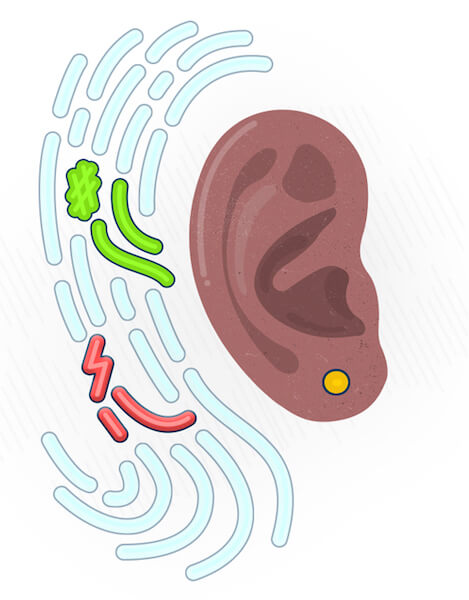
However, Diana Deutsch, a cognitive psychologist at the University of California, found that the brain also partly processes information from the unattended sources (PDF). We can easily and often involuntarily shift attention and become distracted from the original source. We do this, for instance, when hearing the following things:
- our name;
- words that have personal semantic meaning;
- taboo words;
- words that indicate a threat, such as “Fire!”;
- something related to a topic we interested in.
It’s easy to see how this can happen in a space with many people or among likeminded colleagues and friends in a confined space. Some people in the world of psychology believe that attention should be treated as a finite resource.
Attention: A Limited Resource
Daniel Kahneman, a Nobel Prize-winning psychologist and author of “Attention and Effort” (PDF), believes that our attention is a resource that can and is distributed between incoming stimuli. The stimuli that are deemed more important to us are allocated more of our attention.
How does this become problematic?
If we have a limited amount of attention to distribute and our brain is using it to process the chosen source of speech, suppose that a word or noise that has high semantic meaning for us is suddenly heard from an unattended source. Our attention is redistributed, and complete focus on the original source is diminished. Imagine a computer trying to perform too many tasks at once. If the load is too much, it will run out of processing power and begin to perform sluggishly.
This shift of attention manifests itself in the workplace as a drop in performance for task-related stimuli. If we are sitting at our computer, reading or writing, and if the speech around us is personally meaningful, then our focus will no longer be directly on our work, but rather will widen to attend to the source of the speech.
Knowing this information is all well and good, but is avoiding such distractions in the workplace really possible? Below, we’ll discuss how you can avoid them.
Applying This Knowledge To Your Life
To some extent, we can affect our work environment with little alterations every now and again that cost nothing.
Be Aware
Simply acknowledging that some noises have a negative impact on your concentration and attention will help you to respond accordingly.
Variate
- If you have nothing challenging or important going on at hand, go ahead with the (unconscious or conscious) eavesdropping on the conversation or listening to the background radio, TV or music with lyrics.
- When you need to get into the flow with a familiar task, follow the same advice. Your favorite tunes and uplifting, melodic electronic or ambient music could help as well.
- When the time comes for activities that load the memory recall function, consider isolating yourself and tune out with nature sounds. Such tasks could be setting a budget, creating a brand tagline, becoming familiar with a client’s specifications, writing an important message, or reading an article or scientific paper.
Turn Off Notifications And Vibration
This refers to the mobile device you carry around in your pocket or purse all day. While many people work in jobs that are driven by notification interruptions, if your work does not critically depend on reading and replying to all text messages or phone calls, consider turning off your phone’s sound alerts. According to recent research done at the University of California and reported in Steelcase’s “Privacy Crisis” document, “It can take as much as 23 minutes for the mind to return to the task at hand.”
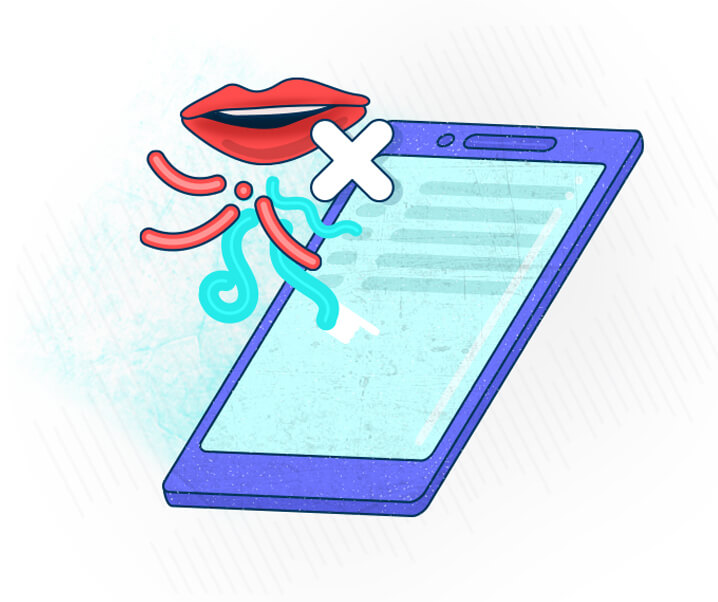
Get Some Privacy
Even when it is acceptable, it might feel socially awkward to forgo the company of colleagues in favor of a retreat to a quiet booth, a free meeting room or a lonely table at the back of a cafeteria — especially in a large, busy office. Some might feel that working apart will make them look lazy or reclusive or that they will miss out on something important. This is hardly true! Tuning out from interruptions and noise — chatter, office machines, ventilation and other ceaseless commotion — and attending to one task, will only do good for you and your career.
Leaving The Desk
Changing the scenery is great for your ears, both in a shared office and at a home desk. Take a break; go outside the building, if possible. The more desktop-focused the work, the harder this will be, as we tend to immerse ourselves in whatever is happening on the screen. Leave your phone at the desk, if possible.
Take A Load Off Your Mind
If there was another way to mask speech and other unwanted noise so that your mind did not have to, presumably you would have more resources or attention to apply to your work. If you become less prone to distraction, you will be able to focus for longer.
People already use music during work hours to reduce external interruptions, and headphones are fast becoming the new wall of privacy in the office. One problem that can arise, though, is music with vocals. While music can provide uplifting melodies and motivational rhythms, lyrical content can shift our attention, essentially causing the problem we are trying to avoid.
One place where speech is seldom found is in the wilderness.
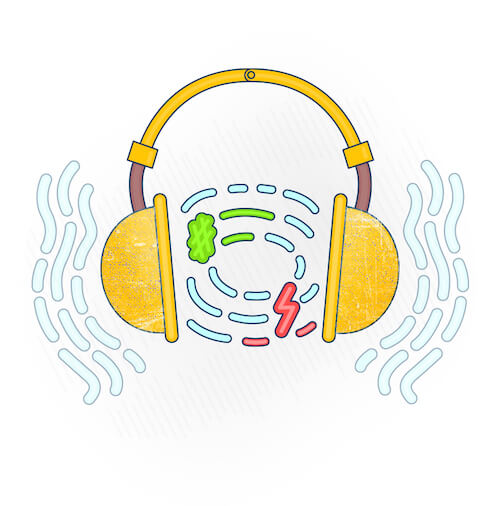
Using The Relaxing Sounds Of Nature For masking
Sounds such as bird songs, the trickle of water and ocean waves have long been used in relaxation methods and programs. Jesper Alverson, of the department of psychology at Stockholm University, found that people recover from mental stress faster when listening to sounds of nature (PDF), compared to other types of noisy environments.
These sounds, then, have utility for our personal well-being, with stress relief and as a sleep aid, for example. This is most likely due to the fact that the sounds contain little or no elements that we would deem threatening and, in turn, distracting, nor do they contain human speech.
A fact of human speech, documented by DPA Microphones, is that natural loud frequencies fall in a relatively narrow area of the spectrum of what we can hear. This means that by listening to natural sounds that we like, we can mask speech and reduce the chances of being distracted by meaningful words or phrases. In effect, the frequencies found in nature sounds will overlap (or mask) those of interruptive speech.
Cover Up With Nature
Finding natural sounds online is simple with SoundCloud, YouTube and dedicated mobile applications. Typical keywords are:
- ambient sounds,
- natural sounds,
- relaxing sounds,
- white noise,
- focus and relaxation sound apps.
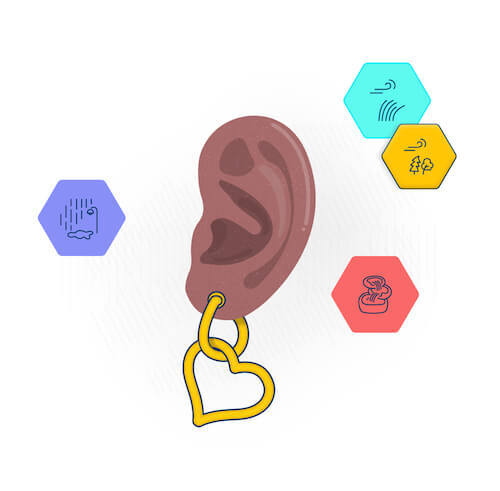
However, be careful with your source because not all recordings of nature reduce mental stress equally. Some sources are not edited and are just basic recordings from the wilderness, and they might contain an imbalance of frequencies — perhaps a lot of bass and little highs, or vice versa, and everything in between. This is called spectral imbalance.
Jessica Erret has found that spectral imbalance in the workplace significantly reduces mental performance. This means that a predominantly louder band of, say, rumbly low-pitch frequencies could cause a drop in concentration. This, however, is not exclusive to low-pitch frequencies; it holds true for the entire hearing range. This shows that a neutral listening environment, where all frequencies are of a similar volume level, is preferable to one that is imbalanced.
Example A has been designed to be balanced, and example B has been designed to be spectrally imbalanced, with the hissy frequencies at a higher volume. These samples were taken and edited from SoundShade, a mobile application that combats the negative effects of noise mentioned in this article.
SoundShade is just one of many applications that are great sources for natural sounds. It is just a case of being aware of sound quality and finding ones that suit you. Similar apps are:
Each app has a different sound library, user interface design and interaction model.
Headphone Choice
SoundShade and the other apps listed above work with any headphones. However, headphones or inner earbuds that reduce the external noise coming into your ears will boost the effectiveness of what you to listen to.
To be clear, noise-cancelling and noise-reducing headphones are different.
Noise-cancelling headphones are:
- very effective at eliminating external noise,
- more expensive,
- often heavy to wear,
- active (some models are battery-powered).
Noise-reducing headphones are:
- less effective at eliminating noise (than active noise-cancelling headphones),
- much more affordable,
- comfortable and discreet,
- available in a wider variety of models,
- passive (no need for a power source).
Conclusion
Unwanted noise in a work environment is a very real problem, and unless it is addressed by solutions and tools that pay close attention to the physiological and psychological effects of noise on our lives, it will only grow larger as more and more open spaces are created.
By using calming sounds that we find pleasing, like those of nature, and carefully crafting them to ensure they don’t contain anything we would find distracting or tiring, we get one step closer to turning once-disruptive environments into places where people enjoy working and that are less likely to cause health issues or negatively affect our lives.
I’ll leave the final word to Christopher Zevitasa and Jonathan Cybulski:
“With a spotlight on natural sounds as part of the therapeutic benefit of nature, and as an important antidote against harmful exposures, or even, as treatment for certain ailments, the nation may begin to appreciate nature settings and parks as more than just leisure spaces. Instead, the natural setting may be viewed as an important therapeutic resource to improve the health and quality of life of the nation.”
Further Reading
- Dealing With Loud And Silent Burnout
- You Are Not A Machine. You Are Not Alone.
- Feeling Stuck? Design What You Don’t Know
- Spotify Playlists To Fuel Your Coding And Design Sessions








